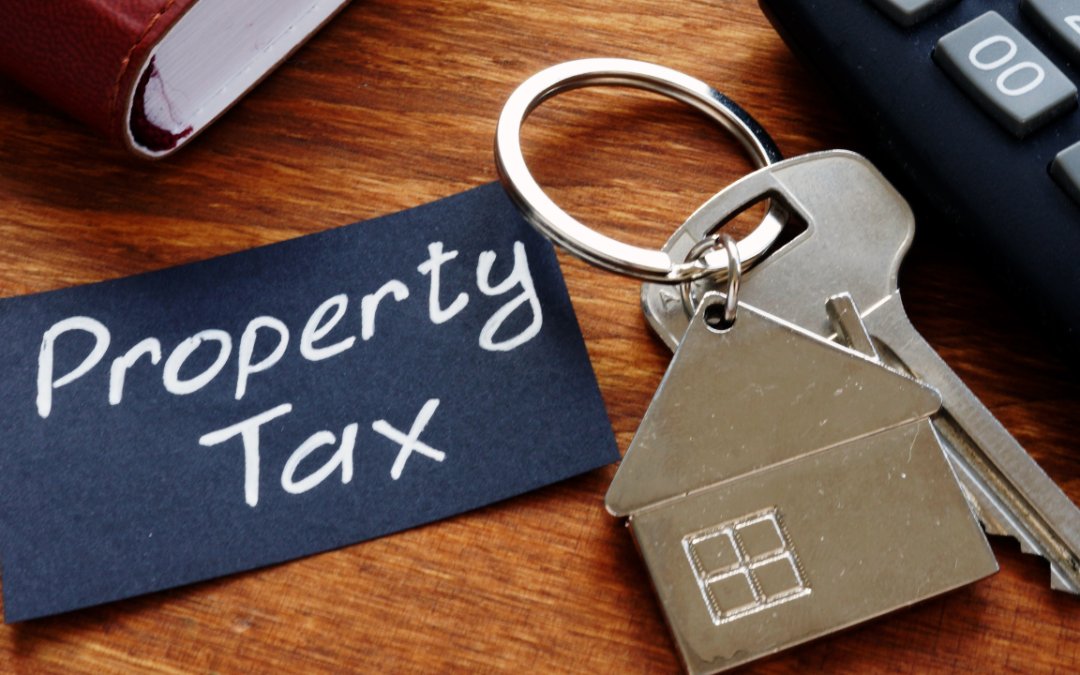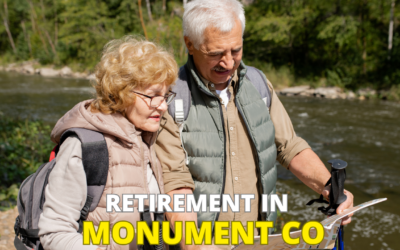Understanding how property taxes work is crucial for homeowners and businesses to manage their finances and plan for the future.
The basics of property taxation involve assessing the value of real estate and applying a tax rate to that value. The tax rate is often expressed as a mill levy, which is the amount of tax per $1,000 of assessed value.
All of the tax rates of the various taxing authorities providing services in your tax area are added together to form the total tax rate.
For example, the county tax rate, school district tax rate, and municipality tax rate may all contribute to the total tax rate. Property tax administration in Monument, CO follows the state’s statutory rules and regulations, which require property not exempted to be taxed evenly and uniformly at current market worth.
Key Takeaways
Property taxes are an important source of revenue for local governments in Monument, CO.
Property taxes are based on the assessed value of real estate and the tax rate, which is often expressed as a mill levy.
Property tax administration in Monument, CO follows state regulations, and property not exempted must be taxed evenly and uniformly at current market worth.
Basics of Property Taxation
What Are Property Taxes?
Property taxes are taxes that property owners pay to their local government. These taxes are used to fund local services such as schools, roads, and public safety. Property taxes are based on the value of the property, and the amount of tax owed is calculated as a percentage of that value.
How Property Taxes Are Calculated
In Monument, CO, property taxes are calculated using a mill levy. The mill levy is a percentage of the assessed value of the property. To calculate the amount of property tax owed, the assessed value of the property is multiplied by the mill levy.
For example, if a property has an assessed value of $100,000 and the mill levy is 13.980, the property tax owed would be $1,398.
It is important to note that the mill levy is not set by the local government. Instead, it is determined by the total amount of revenue needed to fund local services, divided by the total assessed value of all properties in the area.
Role of Property Assessments
Property assessments are used to determine the value of a property for tax purposes. In Monument, CO, property assessments are conducted by the county assessor’s office. The assessed value of a property is based on its market value, which is the price that the property would sell for in an open market.
The county assessor’s office uses a variety of factors to determine the market value of a property, including its location, size, age, and condition. Property owners have the right to appeal their property assessment if they believe it is inaccurate.
Overall, understanding property taxes is an important part of being a property owner in Monument, CO. By understanding how property taxes are calculated and the role of property assessments, property owners can ensure that they are paying their fair share of taxes and are able to budget accordingly.
Property Tax Administration in Monument, CO
Local Taxing Authorities
In Monument, CO, property taxes are collected by multiple local taxing authorities, including the school district, county, and town. Each taxing authority sets its own mill levy, which is the tax rate expressed in mills (one mill is equal to one-tenth of a cent). Property owners in Monument pay taxes to all of the taxing authorities that provide services in their area.
Tax Rates and Mill Levies
The total tax rate in Monument is the sum of the mill levies of all the taxing authorities. The Colorado Division of Property Taxation provides information on the mill levies set by each taxing authority in Monument.
For example, in 2024, the mill levy for the Town of Monument was 2.0 mills, the mill levy for El Paso County was 23.459 mills, and the mill levy for Lewis-Palmer School District was 49.5 mills.
Assessment Appeals Process
If a property owner in Monument believes that their property has been assessed incorrectly, they can appeal the assessment. The first step is to contact the El Paso County Assessor’s Office to discuss the issue.
If the issue is not resolved, the property owner can file an appeal with the El Paso County Board of Equalization. If the issue is still not resolved, the property owner can appeal to the State Board of Assessment Appeals.
Overall, property tax administration in Monument, CO is governed by state law and is overseen by multiple local taxing authorities. Property owners should be aware of the mill levies set by each taxing authority and should understand the assessment appeals process if they believe that their property has been assessed incorrectly.
Payment of Property Taxes
Payment Schedules
Property taxes in Monument CO are due on or before April 30th of each year. The tax year runs from January 1st to December 31st. Taxpayers are encouraged to pay their taxes on time to avoid late payment penalties.
Methods of Payment
The Town of Monument provides several options for taxpayers to pay their property taxes. Payments can be made in person at the Town Hall located at 645 Beacon Lite Road, Monument, CO 80132. Alternatively, taxpayers can mail their payment to the Town of Monument, P.O. Box 9, Monument, CO 80132. Payments can also be made online through the Town of Monument’s website using a credit card or electronic check.
Late Payment Penalties
If property taxes are not paid by the due date, a late payment penalty will be assessed. The penalty is 1% of the unpaid tax for each month or fraction of a month that the tax remains unpaid.
The maximum penalty is 12% of the unpaid tax. In addition to the penalty, interest will also be charged on the unpaid tax at a rate of 1% per month or fraction of a month.
Taxpayers who are unable to pay their property taxes by the due date are encouraged to contact the Town of Monument’s Revenue Department to discuss payment options. The Revenue Department can be reached at 719-481-2954.
Overall, taxpayers in Monument CO are responsible for paying their property taxes on time to avoid late payment penalties. The Town of Monument provides several convenient payment options to make the process easier for taxpayers.
Property Tax Relief Programs
Monument CO offers several property tax relief programs to help taxpayers reduce their property tax burden. These programs include exemptions, deferral programs, and rebate programs.
Exemptions and Discounts
Monument CO offers several exemptions and discounts to eligible taxpayers. These exemptions and discounts include:
Senior Citizen Exemption: This exemption is available to senior citizens who are 65 years or older and have lived in their home for at least 10 consecutive years. The exemption amount is based on the actual value of the property and is adjusted annually.
Disabled Veteran Exemption: This exemption is available to disabled veterans who have a service-connected disability rating of 50% or more. The exemption amount is based on the actual value of the property and is adjusted annually.
Property Tax Deferral for Active Military: This program allows active military personnel to defer their property tax payments until they are no longer on active duty.
Deferral Programs
Monument CO offers several deferral programs to eligible taxpayers. These programs allow taxpayers to defer their property tax payments until a later date. The deferral programs include:
Property Tax Deferral for Senior Citizens: This program allows senior citizens who are 65 years or older and have lived in their home for at least 10 consecutive years to defer their property tax payments until they sell their home or pass away.
Property Tax Deferral for Disabled Persons: This program allows disabled persons to defer their property tax payments until they sell their home or pass away.
Rebate Programs
Monument CO offers several rebate programs to eligible taxpayers. These programs allow taxpayers to receive a rebate on their property taxes. The rebate programs include:
Property Tax Rebate for Low-Income Seniors: This program allows low-income seniors who are 65 years or older and have lived in their home for at least 10 consecutive years to receive a rebate on their property taxes.
Property Tax Rebate for Disabled Persons: This program allows disabled persons to receive a rebate on their property taxes. The rebate amount is based on the actual value of the property and is adjusted annually.
Overall, Monument CO offers several property tax relief programs to help eligible taxpayers reduce their property tax burden. Taxpayers are encouraged to contact the Monument CO Department of Revenue for more information on these programs and to determine their eligibility.
Understanding Tax Statements
When it comes to understanding property taxes in Monument CO, it is important to know how to read your tax bill. Tax statements can be confusing, but with a little guidance, you can easily understand what you are paying for.
Reading Your Tax Bill
Your tax bill will include a variety of information, including the assessed value of your property, the current tax rate, and the total amount of taxes due. It will also include information about any exemptions or credits that you may be eligible for.
One of the most important things to look for on your tax bill is the due date. If you fail to pay your property taxes by the due date, you may be subject to penalties and interest charges.
Common Charges and Terms
There are a number of common charges and terms that you will see on your tax bill. These include:
Mill Levy: The tax rate is often expressed as a mill levy. This is the amount of tax that you pay per $1,000 of assessed value. For example, if the mill levy is 10 and your property is assessed at $100,000, you would pay $1,000 in property taxes.
Assessed Value: This is the value that the local government assigns to your property for tax purposes. It is typically based on the market value of your property, but it may be adjusted based on factors such as the condition of your property.
Total Tax Rate: This is the sum of all the tax rates of the various taxing authorities providing services in your tax area. For example, if your property is located in a school district, a fire district, and a county, you would pay taxes to each of these entities, and the total tax rate would be the sum of all of these rates.
Exemptions and Credits: There may be a variety of exemptions and credits that you are eligible for, such as a homestead exemption or a senior citizen tax credit. These can help to reduce your property tax bill.
By understanding how to read your tax bill and the common charges and terms that you may encounter, you can gain a better understanding of your property taxes in Monument CO.
Impact of Property Taxes On Homeowners
Property taxes play a significant role in the financial lives of homeowners in Monument, CO. They are a major source of revenue for local governments, which use the funds to finance various public services and infrastructure projects. Homeowners in Monument, CO, pay property taxes based on the assessed value of their homes. The property tax rate in Monument, CO, is 0.727%.
Property taxes can have a significant impact on a homeowner’s monthly budget. As property values increase, so do property taxes. This can make it difficult for some homeowners to keep up with their mortgage payments and other expenses. In some cases, homeowners may be forced to sell their homes if they are unable to afford the property taxes.
On Community Services
Property taxes are essential for funding local amenities and services in Monument, CO. They help pay for schools, police and fire departments, parks, libraries, and other public services that benefit the community. The revenue generated from property taxes is also used to maintain and improve infrastructure, such as roads, bridges, and public transportation.
Without property taxes, many of these services would not be possible. Therefore, it is important for homeowners to pay their fair share of property taxes to ensure that these services continue to be available to the community.
In conclusion, property taxes have a significant impact on both homeowners and the community in Monument, CO. While they can be a burden on homeowners, they are essential for funding public services and infrastructure projects that benefit the community as a whole.
Challenging Your Tax Assessment
If a homeowner believes that their property tax assessment is too high, they have the right to appeal the assessment. Challenging a property tax assessment can be a complex process, but it is possible to succeed with the right approach.
Grounds for Appeal
There are several grounds for appealing a property tax assessment in Monument CO. Some of the most common grounds for appeal include:
Incorrect property valuation: If the county assessor has overvalued a property, the homeowner can appeal the assessment.
Inequitable assessment: If the county assessor has assessed a property at a higher rate than other similar properties in the area, the homeowner can appeal the assessment.
Errors in property description: If the county assessor has made errors in the description of the property, such as incorrect square footage or number of bedrooms, the homeowner can appeal the assessment.
The Appeal Process
The appeal process for challenging a property tax assessment in Monument CO involves several steps. The first step is to file a protest with the county assessor’s office. The deadline for filing a protest is June 1st of each year, or the next business day if June 1st falls on a weekend. The protest must be filed on the appropriate form and include the grounds for the appeal.
After the protest is filed, the county assessor’s office will review the assessment and may schedule a hearing to discuss the appeal with the homeowner. The homeowner should be prepared to provide evidence to support their appeal, such as recent property sales in the area or a recent appraisal of the property.
If the homeowner is not satisfied with the outcome of the hearing, they can appeal the decision to the Board of Assessment Appeals. The Board of Assessment Appeals is an independent body that reviews property tax assessments and has the authority to adjust the assessment if necessary.
In conclusion, challenging a property tax assessment in Monument CO can be a daunting task, but it is possible to succeed with the right approach. Homeowners should be familiar with the grounds for appeal and the appeal process to increase their chances of success.
Property Tax Trends in Monument, CO
Monument, CO property taxes are based on the assessed value of real property. The property tax rate is determined by the total amount of revenue needed to fund local government services, such as schools, police, fire protection, and other public services. The assessed value of real property is determined by the local assessor’s office, which is responsible for determining the market value of each property in the area.
The property tax rate in Monument, CO varies depending on the local government’s budgetary needs. According to the Division of Property Taxation, the tax rate is often expressed as a mill levy, which is the amount of tax per $1,000 of assessed property value.
In 2024, the property tax rate in Monument, CO is expected to remain steady, with no significant changes from the previous year. According to Direct Tax Loan, property not exempted must be taxed evenly and uniformly at current market worth. Owner’s rights to reasonable notice of tax levy increases are also obligatory. Within those boundaries, Monument devises tax levies.
In 2023, Colorado property taxes saw a 40 percent value jump, but Garfield County leaders plan to reduce the county’s property tax rate so that new money coming in will more closely align with the county’s actual needs, according to CPR.
Overall, property tax trends in Monument, CO are stable and predictable. Property owners can expect to pay taxes based on the assessed value of their property, with rates determined by local government needs and budgetary constraints.
Frequently Asked Questions
How are property taxes calculated in Monument, Colorado?
Property taxes in Monument, Colorado are calculated by multiplying the assessed value of the property with the total tax rate for the area. The assessed value is determined by the El Paso County Assessor’s Office, which takes into account factors such as the size and condition of the property. The total tax rate is the sum of the tax rates of all the taxing authorities that provide services in the area.
What are the current property tax rates in El Paso County, Colorado?
The current property tax rates in El Paso County, Colorado vary depending on the location and the type of property. As of 2024, the average property tax rate in El Paso County is 0.900%, which is slightly lower than the state average of 0.989%. However, it is important to note that the actual tax rate for a specific property may be different depending on the total tax rate for the area.
How can I find my property tax statement for a property in Monument, CO?
Property tax statements for properties in Monument, CO can be found on the El Paso County Treasurer’s website. Property owners can search for their property using the property address or the owner’s name. The website also provides information on how to pay property taxes online or by mail.
What changes were made to Colorado property tax laws in 2024?
As of 2024, there were no significant changes made to Colorado property tax laws. However, it is important to note that property tax laws are subject to change, and property owners should stay informed about any updates or changes that may affect their property taxes.
What is the average property tax amount for homeowners in Colorado?
The average property tax amount for homeowners in Colorado is $2,241 per year, which is slightly higher than the national average of $2,127 per year. However, the actual property tax amount for a specific property may be different depending on factors such as the assessed value of the property and the total tax rate for the area.
Are property tax payments in Colorado eligible for any deductions?
Property tax payments in Colorado may be eligible for deductions on federal income tax returns, subject to certain limitations. Property owners should consult with a tax professional or refer to IRS guidelines for more information on eligibility and deductions.
Explore Monument Colorado
Pros and Cons of Living in Monument Colorado
Is Monument a good place to live ? Monument, Colorado is a small town located in the northern part of El Paso County, Colorado. It is situated between the foothills of the Rocky Mountains and the prairies of the Great Plains, offering a unique blend of rural and...
Retiring in Monument, Colorado: Your Dream Destination Unfolds
Considering retiring in Monument, CO? Monument, Colorado is a beautiful place to retire, offering stunning scenery, a vibrant community, and diverse living options. But before you make the move, it's important to consider the cost of living. Here's a quick overview:...
55+ Adult Community Homes For Sale in Monument, CO
55+ adult community homes in Monument, CO are becoming increasingly popular among retirees and older adults who want to live in a community with like-minded individuals.These communities are designed to cater to the specific needs and interests of older adults,...
Is Monument Colorado a good place to live ?
Introduction to Monument, Colorado Nestled at the foothills of the majestic Rocky Mountains, Monument, Colorado, presents a unique blend of small-town charm and modern living. With its picturesque landscapes, vibrant community, and easy access to both natural...








